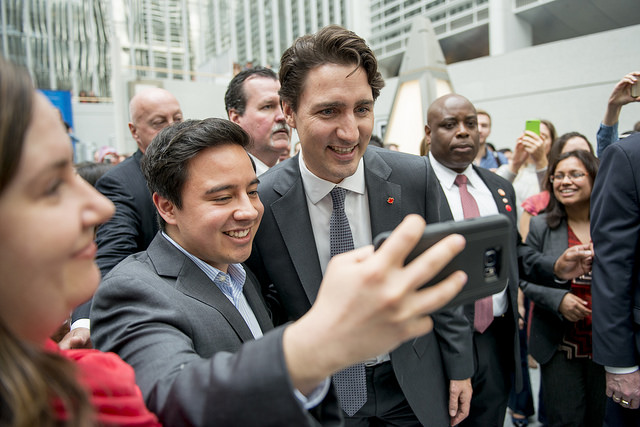Like this article? rabble is reader-supported journalism. Chip in to keep stories like these coming.
It was a night for nostalgia, the eighth and last White House Correspondents Dinner for U.S. President Barack Obama. The one-time Harvard Law Review editor and community organizer, a basketball-savvy president with worldwide appeal, was doing his final stand-up before the audience of media, political and Hollywood stars.
Obama opened his routine with reflections on how the office had changed him in eight years; he was no longer the young, impressive, bright light on the scene. Indeed, the president had recently been told to his face that this role was now being played by Justin Trudeau. Obama quipped, “I told Justin” that was simply not true.
Canada has a celebrity prime minister, one who makes much of the country feel better about itself. After Stephen Harper, a new departure was sorely needed, and it hardly needs saying, Trudeau represents a welcome change.
Even better would be the disappearance of remaining vestiges of “Harperism” such as hyper partisanship orchestrated from the Prime Minister’s Office by high-profile aides.
In his first six months, the new prime minister has shown a capacity to act quickly and decisively. The long-form census was restored virtually immediately after the Trudeau cabinet was sworn in. Ending air strikes against ISIS forces in Iraq and Syria took a little longer.
Trudeau wasted no time naming his Quebec election campaign manager Ambassador to the United Nations, and his Ontario campaign manager Ambassador to Washington, making what rabble.ca parliamentary correspondent Karl Nerenberg aptly identified as dubious appointments.
A senior Liberal adviser told Maclean’s political editor Paul Wells that Canada needed a “lobbyist” in Washington, not another “distinguished elder statesman.” Really?
Washington is teeming with lobbyists. Each of them has a suitcase full of money to hand around to senators and congressional representatives, money needed for re-election campaigns.
What can a lobbyist without money accomplish as Canadian ambassador? Noises are being now being made that Canada has not ruled out buying the U.S.-designed F-35 first-strike fighter bomber, despite years of bad reports about the troubled aircraft, and the Trudeau campaign declaration that it would not be considered for purchase.
Astonishingly, the Trudeau government is considering new Canadian participation in the ludicrously expensive and wasteful anti-ballistic missile defence system, a.k.a., Star Wars.
Has a rookie Canadian ambassador decided to lobby Ottawa on behalf of Washington? There is not much more for them to get from Canada.
Under terms of the 1989 Canada-U.S. free trade agreement, Canada gave up its traditional subsidies to industry. The exception was for those arms, weapons and military equipment manufactures benefiting from a “national security” exemption, and able to grow alongside the U.S. military-industrial complex.
As a result, Canadian economic policy consists of making regional grants to support military equipment and arms suppliers; and these industrial benefits are now the main (poor) instrument for job creation.
In 1989, in return for giving up supporting new industry, Canadians were told they were getting access to the U.S. market, a market to which Canada already had access, as the average tariff on all Canadian exports was one per cent prior to the bilateral deal.
In effect, Canada was integrating itself into the American military model of economic development. In return for partial membership in the U.S. military-industrial complex, Canada gave up much of its sovereignty in foreign and defence policy.
Half of Canadian military exports go to the United States and an increasing number go to Third World nations.
The Trudeau government has gotten itself into a public-relations mess by supporting armoured vehicle exports to Saudi Arabia. In the past, the vehicles have been used to suppress popular revolt against the regime.
Canada is making military sales in violation of international human rights commitments because its Industrial Regional Benefits policy is built around military production.
The Trudeau government should be re-thinking economic strategy, assessing how long Canada can continue to take direction from Washington, weighing the community economic renewal option, and rejecting the straitjacket imposed by international trade deals like the Trans-Pacific Partnership or the Canada-European Union Comprehensive Economic and Trade Agreement.
In his first six months in office, Justin Trudeau has shown he handles the communications side of being prime minister with aplomb. But making the Canadian government work for all Canadians requires more than showing up with a smile and a shoeshine.
Duncan Cameron is former president of rabble.ca and writes a weekly column on politics and current affairs.
Photo: World Bank Photo Collection/flickr
Like this article? rabble is reader-supported journalism. Chip in to keep stories like these coming.



